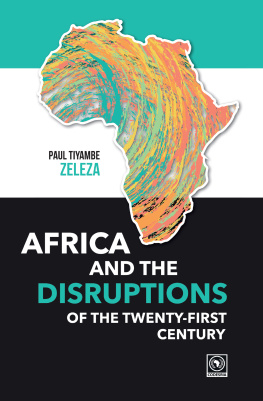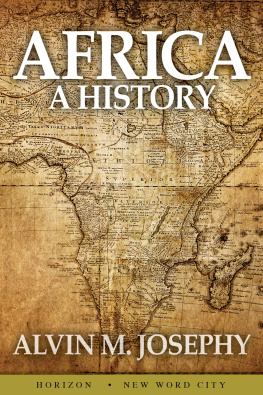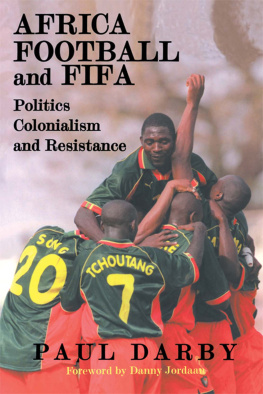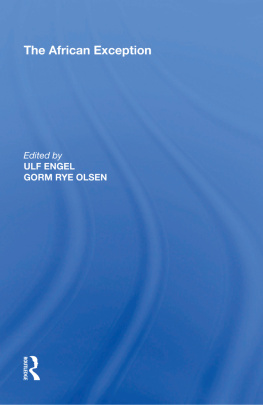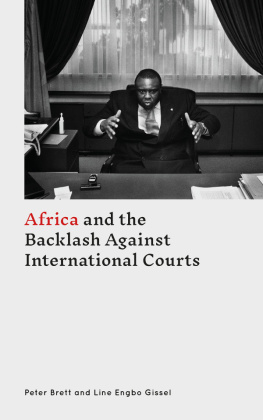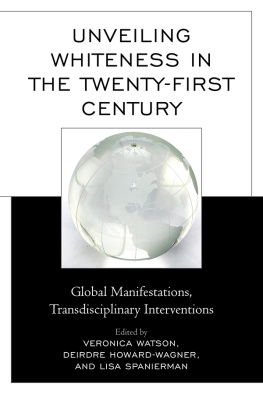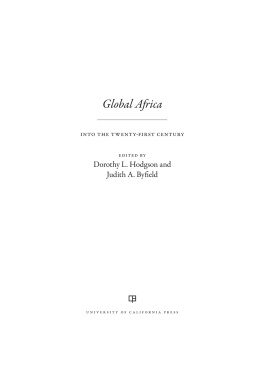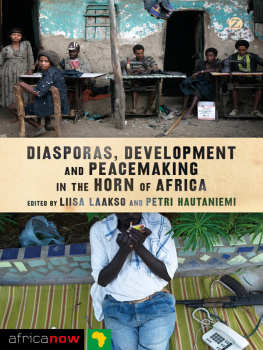
Africa and the Disruptions of the Twenty-first Century
This book is part of the CODESRIA Book Series.
Africa
and the Disruptions
of the Twenty-first Century
Paul Tiyambe Zeleza

Council for the Development of Social Science Research in Africa
DAKAR
CODESRIA 2021
Council for the Development of Social Science Research in Africa
Avenue Cheikh Anta Diop, Angle Canal IV
BP 3304 Dakar, 18524, Senegal
Website: www.codesria.org
ISBN: 978-2-86978-997-5
All rights reserved. No part of this publication may be reproduced or transmitted in any form or by any means, electronic or mechanical, including photocopy, recording or any information storage or retrieval system without prior permission from CODESRIA.
Typesetting: Alpha Ousmane DIA
Cover Design: Genevieve Simpson
Distributed in Africa by CODESRIA
Distributed elsewhere by African Books Collective, Oxford, UK
Website: www.africanbookscollective.com
The Council for the Development of Social Science Research in Africa (CODESRIA) is an independent organisation whose principal objectives are to facilitate research, promote research-based publishing and create multiple forums for critical thinking and exchange of views among African researchers. All these are aimed at reducing the fragmentation of research in the continent through the creation of thematic research networks that cut across linguistic and regional boundaries.
CODESRIA publishes Africa Development, the longest standing Africa based social science journal; Afrika Zamani, a journal of history; the African Sociological Review; Africa Review of Books and the Journal of Higher Education in Africa. The Council also co-publishes Identity, Culture and Politics: An Afro-Asian Dialogue; and the Afro-Arab Selections for Social Sciences. The results of its research and other activities are also disseminated through its Working Paper Series, Book Series, Policy Briefs and the CODESRIA Bulletin. All CODESRIA publications are accessible online at www.codesria.org.
CODESRIA would like to express its gratitude to the Swedish International Development Cooperation Agency (SIDA), the Carnegie Corporation of New York (CCNY), Andrew W. Mellon Foundation, the Open Society Foundations (OSFs), UNESCO, Oumou Dilly Foundation, Ford Foundation and the Government of Senegal for supporting its research, training and publication programmes.
Contents
I
Americas Racial Dysfunctions
II
Navigating Global Turbulence
III
Africas Political Dramas
IV
Africas Persistent Mythologisation
V
Disruptions in Higher Education
Epilogue
In Memory of Two Intellectual Icons
I write this preface in the midst of the coronavirus pandemic and lockdowns in many countries around the world, including Kenya where I currently live. A major crisis is not only hugely disruptive, it always holds a giant mirror to society and in this case to the world at large, exposing its underlying structural deformities and dysfunctions.
The coronavirus pandemic offers a stark reflection of national and global political economies in disarray and the colossal underinvestments in the economic and social well-being of the masses of working people. Engendering the multiple crises brutally pried open by the pandemic were the austerities, inequalities and ideological inanities of neoliberal globalisation, retrogressive populisms and wanton assaults on nature and the environment.
The essays in this volume seek to make sense of the various disruptions and dysfunctions of the early twenty-first century for Africa, of which the coronavirus pandemic is sadly symptomatic. They were written from two locations, namely, the United States where I lived for more than two decades and Kenya where I moved to take up a new position in January 2016.
Thus, they reflect discourses from mutually reinforcing spatiotemporal positions, in North America and Africa, the global North and the global South, the African continent and the diaspora. As such, the essays combine observations and analyses of developments in these spaces that particularly intrigued me or struck me as significant. In short, they represent my personal meditations as an engaged Pan-African scholar and global citizen on key developments during the second decade and beginning of the third decade of the twenty-first century.
The essays first appeared in various outlets. Some were presented as keynote addresses. Others were published in the traditional media. Many more were posted as blogs on social media. Several were transposed from one medium to another. But they all retain, with minor adjustments, their original content and flavour. For each essay, I have indicated the date on which it was written or delivered. This opens a window into both the framing of public debates and my own perspectives at the time the different essays were written.
As always, my writings benefit from numerous engagements with my extensive network of intellectual friends, collaborators and critics in various parts of the world, especially the transatlantic Pan-African world. I would like to thank all of them for the intellectual sustenance I derive from them. I trust they will understand that I have refrained from naming them individually to avoid making this preface too long and for fear of missing out anyone.
But I trust it is in order to mention Cassandra Rachel Veney, my life partner, best friend and intellectual interlocutor who is always the first person to read anything I write before it leaves our intimate and exclusive conversations and enters the public realm. She is incredibly incisive in her comments and critiques, thorough in picking up poor writing and awkward expressions and generous in her prodding for greater clarity in my arguments and backup evidence.
As I get older, I become more preoccupied, counterintuitively, with the future of my beloved continent, our global diaspora and the world at large. I am keener than ever about the quality of education we give our young people and the mentoring that the members of my generation provide to younger scholars. I am worried about the world we have created for future generations. But I am also more hopeful as I watch and witness the amazing energy, imagination, creativity, agency and fearlessness of young people.
I dedicate this book to the young people in my personal and professional life, including my students at USIU-Africa and other universities at which I taught in recent years, and to the young members of my transnational extended family. I hope they will continue striving to create a better world than the one recorded in this book.
Nairobi, 25 July 2020
AAU African Association of Universities
ACB Anti-Corruption Bureau
ADB Asian Development Bank
AFL-CIO American Federation of Labor
ANC African National Congress
ASA African Studies Association
AU African Union
BRICS Brazil, Russia, India, China and South Africa
CADFP Carnegie African Diaspora Fellowship Program
CARES Coronavirus Aid, Relief, and Economic Security
CARICOM Caribbean Community
CBC Congressional Black Caucus
CCNY Carnegie Corporation of New York
CIA Central Intelligence Agency
CNN Cable News Network
CODESRIA Council for the Development of Social Science Research in Africa
COSATU Congress of South African Trade Unions
DMC Developing Member Countries
DPP Democratic Peoples Party
ECOWAS Economic Community of West African States
Next page
